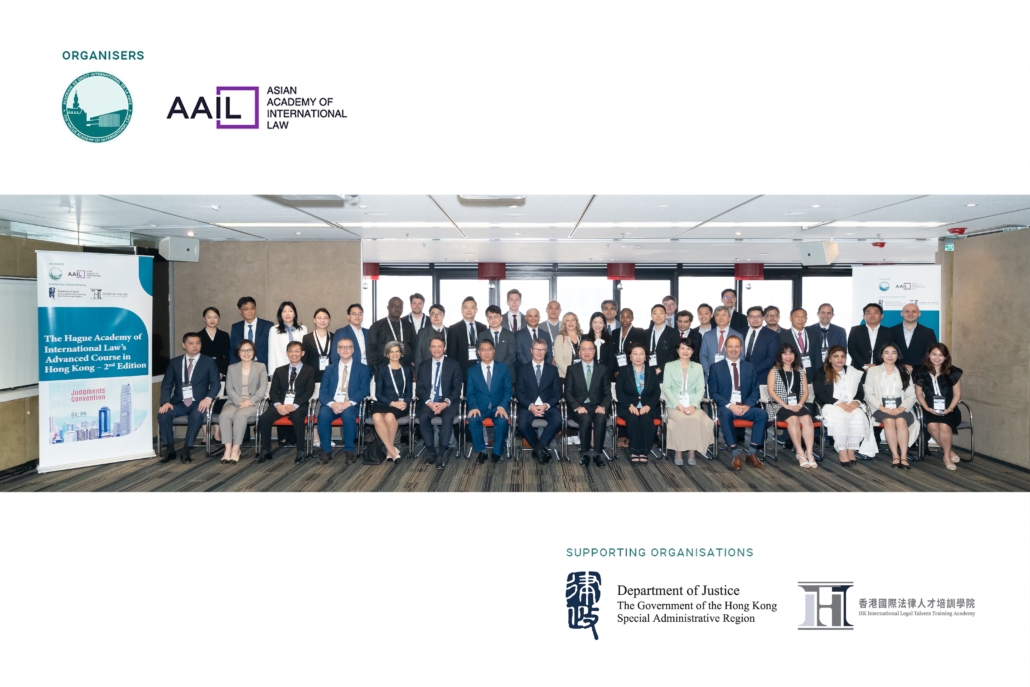
From 2 to 6 December 2024, the second edition of The Hague Academy of International Law’s Advanced Course in Hong Kong was held, co-organised by the Asian Academy of International Law (AAIL) with the support of the Department of Justice of the Government of the Hong Kong SAR. Once again, the Hague Academy of International Law brought distinguished speakers to the “fragrant harbour” to deliver lectures on the “Recognition and Enforcement of Foreign Judgments in Civil or Commercial Matters”. Just a stone’s throw from the Old Supreme Court Building (now the seat of Hong Kong’s Court of Final Appeal) at the premises of the Hong Kong Club, legal scholars, national judges, government officials and legal practitioners from over 20 jurisdictions as diverse as Laos, the People’s Republic of China, (francophone) Cameroon, The Netherlands, South Africa or the Kingdom of Saudi Arabia came together to discuss their respective experiences and the prospects of the latest instrument in this field, the HCCH 2019 Judgments Convention.
Following the opening remarks (Jean-Marc Thouvenin, Secretary-General of The Hague Academy of International Law and Lam Ting-kwok Paul, Secretary for Justice of the Government of the Hong Kong SAR), Teresa Cheng (Founding Member and Co-Chairwoman of the AAIL) proceeded to give the opening lecture on the recognition and enforcement of foreign judgments in the Hong Kong SAR.

In the afternoon, Pietro Franzina (Catholic University of Milan) focused on “Contemporary Approaches to the Recognition and Enforcement of Foreign Judgments”. As part of a comparative overview, he developed a taxonomy of the legal frameworks for recognition and enforcement based on their operational context (simple/double instruments), their legal sources (unilateral-domestic, international, regional/supranational) and the type of decisions they are concerned with (final and conclusive judgments with res judicata effect, decisions on situations with an evolving character). He particularly emphasised that international as well as regional rules are fragmentary in nature. Hence, despite their designation, treaties such as the HCCH 2019 Judgments Convention do not actually set out rules for the enforcement of decisions, but rather determine the criteria for the enforceability of a judgment, which must then be carried out according to the applicable rules of domestic law. Building on this foundation, Franzina’s second lecture on Thursday morning explored the doctrinal puzzle the HCCH 2019 Judgments Convention presents with respect to “Preliminary Questions Outside the Scope and Judgments Consisting of Severable Parts”. Drawing on the notion of “complex judgments”, he masterfully illustrated the carefully drafted solutions the Convention offers to address borderline cases, but also the unavoidable gaps that nonetheless exist in this regard. The lecture culminated in a lively discussion regarding the ground of refusal for judgments on exemplary or punitive damages (Art. 10), which – according to Franzina – was designed to apply not only in civil law systems, but also in common law jurisdictions, insofar as different standards apply across the latter jurisdictions as regards the award of such damages. The rule in Article 10, it was observed, is meant to ease the difficulties that may arise in asserting the public policy exception (Art. 7 (1) lit. c)) as regards foreign judgments awarding more than compensatory damages.
At Tuesday morning, Giuditta Cordero-Moss (University of Oslo) started her lecture on precisely on this topic: “Public Policy as a Limit to Enforcement and Recognition”. While reminding the audience of the importance of an autonomous interpretation (Art. 20) in line with the principles enshrined in the Vienna Convention on the Law of Treaties (VCLT), she presented the public policy exception as part of one important line of development within (see Art. 2 HCCH 1958 until Art. 22 HCCH 2007) and outside (e.g. Art. 34 Lugano 2007) the HCCH ecosystem. With particular focus on the parallels to the New York Convention, she raised the question of the appropriate intensity of public policy control. Under the former instrument, at least two levels of scrutiny have emerged: A “maximalist” theory, according to which the court assesses the matter de novo (e.g. Westacre Investments v. Jugoimport-SDPR Holdings, [1999] 3 All ER 864 , 885), and a “minimalist” theory, according to which a “manifest” breach can – in deference to the arbitral tribunal’s evaluation – only be reviewed to the extent that the issue has not yet been discussed by the tribunal itself (e.g. CA Paris, 18 novembre 2004, Thalès Air Defence, Rev arb. 2005 751). Later, Cordero-Moss turned to the perceived overlaps with other provisions of the Convention. Most significantly, the public policy exception can be combined with the other defences set forth in Art. 7 HCCH 2019 Judgments Convention in order to meet the threshold of “manifest incompatibility” with the essential policies of the requested State. Surprisingly, this reasoning according to the Explanatory Report does not apply to punitive damages exception in Art. 10 (Garcimartín/Saumier, paras. 265). The excellent and remarkably insightful presentation concluded on Wednesday afternoon with a discussion of pertinent substantive cases in the areas of competition, corporate and labour law. Among other things, the speaker discussed the complex case of the English “floating charge”, which allows for a security right in rem that is not attached to assets before it is “crystallised” at a specified future event, and thus could conflict with the numerus clausus principle of property rights, as found in many civil law jurisdictions.
Then, Shen Hongyu (Chief Judge of the Supreme People’s Court) dedicated her part of the course on “Unfolding the 2019 Hague Convention” to share “China’s Perspective on International Recognition and Enforcement”. Her remarks offered important insights into the drafting process of both, the recent amendments to the Chinese Civil Procedure Law and the new Law of the People’s Republic of China (PRC) on Foreign State Immunity (1 September 2023). As reported before on col.net, the latter provides for a fundamental shift in China’s stance towards the immunity of foreign States, moving from an absolute position to the adoption of a more restrictive approach. Presumably, this step is not unconnected to China’s endeavour to widen its economic influence via the Belt and Road Initiative. Furthermore, Judge Shen shed some light on the very peculiar approach to indirect jurisdiction in Art. 301 Civil Procedure Law (2023). By referring this question, on a first level, to the lex fori of the court of origin, China’s recognition rules at first appear to place a great deal of trust in foreign law (though not so much in the originating court’s application of that law), only to then implement a second level of control by requiring the foreign court to have an “appropriate connection with the case” according to standards ultimately set by the requested court, explicitly including the violation of an exclusive choice of court agreement and the provisions of exclusive jurisdiction of the PRC. Thanks to Judge Shen’s well-founded explanations, it became clear that the emergence of this rather complicated solution, which might be called “(modified) double control”,[1] was the result of a compromise between the proponents of a pure “mirror principle” and a simple “foreign law” approach. In this way, the new law, whilst being generally open to foreign law, is at the same time supposed to effectively prevent foreign courts from abusing their jurisdiction through “long-arm” statutes. Finally, the Supreme Court Judge also expressed the view that, if China were to become a party to the HCCH 2019 Judgments Convention, it would most likely utilise the option granted under Art. 17 to exclude from its material scope all matters for which it currently claims exclusive jurisdiction (see Art. 279 Civil Procedure Law), including disputes concerning some specific Sino-foreign joint venture contracts.

As a special treat for all participants, Matthias Lehmann (University of Vienna) gave two highly anticipated afternoon lectures on “Crypto Currency and International Law”. Despite the short time frame on Tuesday and Wednesday, he nonetheless expertly managed to explain the complex technical structures underlying and characterising the blockchain, as well as the resulting legal implications. Since all the nodes constituting the blockchain network are spread across different places around the world, digital assets based on this technology (such as Bitcoin or Ether) can hardly be localised in just a single place. While courts and legislators in several jurisdictions have taken on the challenge this decentralised structure is posing for the traditional mechanisms of Private International Law (e.g. Cheong Jun Yoong v Three Arrows Capital Ltd, (2024) SGHC 21), Lehmann, in a more radical approach, proposed to take the results of the innovative technology more seriously. Since the transfers recorded in the blockchain cannot be undone, the distribution of assets provided for by the technology should be presumed to be legitimate. In essence, this suggestion represents what in a legal context could also be understood as a uniform international rule of property law. However, as it is the case with real property, this does not mean that transfers according to that rule are necessary final. Rather, where it can be shown that the digital asset has been acquired illegally, the presumption is rebutted, and the traditional (conflict of laws) rules apply.
On Wednesday and Friday, the author of these lines added with two lectures on “The Jurisdictional Filters”. Positioned at the “heart” of the Convention in terms of function and policy, the positive requirements set forth in Arts. 5 and 6 HCCH 2019 Judgments Convention are intended to filter out decisions based on unacceptable assumptions of direct jurisdictions by the courts of the State of origin. After a short introduction to the general concept of indirect jurisdiction, as (first?) described by Etienne Bartin, there was a brief tour d’horizon of various approaches towards the standards of indirect jurisdiction, including general clauses (e.g. Canada’s “real and substantial connection” test), negative lists enumerating exorbitant grounds of indirect jurisdiction (e.g. Greek-German Agreement of 4 November 1961), the “mirror principle” (e.g. Spain’s Art. 46 de Ley de Cooperación Jurídica Internacional) or of course section 328 (1) no. 1 German Code of Civil Procedure – the mirror principle seems to be a “German” invention by Paul Johann Anselm Feuerbach in 1812) as well as the peculiar “(modified) double control” (see above for Art. 301 PRC Civil Procedure Law) or the (unsuccessful) proposal of a mixed convention, as developed by Arthur von Mehren (e.g. HCCH 1999 Draft of a Judgments Convention). This first lecture concluded with a discussion of elements common to all filters with practical relevance, inter alia, burden and standards of proof, as well as the admissibility of anti-enforcement injunctions based on a “better” interpretation of the Convention, the impact of the arbitration exception in Art. 2 (3) HCCH 2019 Judgments Convention or the role, if any, for anti-enforcement injunctions. On this basis, the second lecture approached the somewhat more than 20 jurisdictional filters and their modifications respectively, depending on the manner of counting, as provided for in the Convention. For this task, it appeared reasonable to distinguish between five groups of filters: 1. Personal connections of the defendant; 2. Forms of consent; 3. Connections of the subject matter; 4. Modifications for the protection of weaker parties; 5. Exclusive Filters. For the purpose of highlighting the pits and downfalls of each jurisdictional filter, the presentation was structured around short hypothetical case illustrations, which were actively discussed with the participants. For example, under Art. 5 (1) lit. d) it is not sufficient, that the branch from which the claim in dispute arose existed at that time, but not anymore when the proceedings where instituted in the court of origin. Furthermore, in light of Switzerland’s recent declaration to apply the HCCH 2005 Choice of Court Convention likewise to non-exclusive forum selection agreements, the precise delineation of the two instruments, as originally envisaged in Art. 5 (1) lit. m), might soon gain significantly more importance. Last but not least, a special emphasis was placed on “false friends” provisions that may look familiar to the legal practitioner from his/her own law, while in fact differing in detail. For instance, Art. 5 (1) lit. a) foresees jurisdiction at the place of the habitual residence of the “person against whom recognition or enforcement is sought”, while Art. 22 PRC Civil Procedure law is limited to the “defendant” in the original proceedings.

Besides the lectures, the Course’s unofficial theme became somewhat of an “autograph session”. Following a spontaneous idea on making use of “the book” (the only available copy at that time) that had emerged from the HCCH/University of Bonn Conference on the HCCH 2019 Judgments Convention in 2023, all attendees here were again invited to sign a “commemorative copy”, this time the “Hong Kong edition”, thereby following the “Bonn edition”, and we of course hope that further editions might follow. We were happy to see that the trend was catching on, as Judge Shen joined in by inviting the audience to autograph a copy of the “Annotated International Commercial Cases from the Supreme People’s Court”. Even more professionally, admittedly, there was even a prize awarded for the tenth person (a fortunate number in Chinese numerology, as it seems) putting his or her signature in the collection of cases.
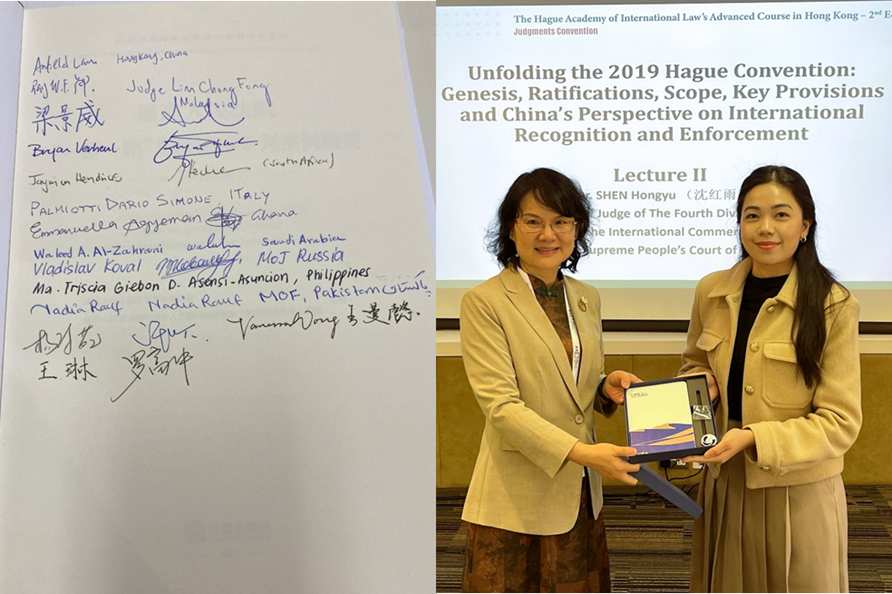
Coming full circle, Teresa Cheng delivered the programme’s final presentation on “Arts. 22 and 25 of the HCCH Judgment Convention” focussing on the Mutual Arrangements between the Mainland and the Hong Kong SAR. Based on Art. 95 of the Hong Kong Basic Law, there are several legal frameworks in place that have drawn inspiration from the HCCH Conventions. Although Cheng expressed some doubts about the application of the notion of “territorial units” to Hong Kong, she was ultimately certain that these regional frameworks would remain unaffected by virtue of Art. 22 HCCH 2019 Judgments Convention. This is, of course, subject to ratification by the PRC and extension of its effect to the Hong Kong SAR in accordance with Art. 25 of the 2019 HCCH Judgments Convention. As alluded to in the opening lecture, China’s special situation as a bi-jural legal system, with the Hong Kong SAR as the common law counterpart to civil law based legal system of the People’s Republic of China, lends itself to some legal innovations naturally arising from this coexistence. For example, Art. 4 of the recent Arrangement on Reciprocal Recognition and Enforcement of Judgments in Civil and Commercial Matters specifically excludes anti-suit injunctions from its scope. Likewise, Art. 3 (8) of the same legal framework wisely addresses “cases on the recognition and enforcement of judgments or arbitral awards of other countries or regions”, and thus excludes from its scope decisions that simply merge foreign judgments or arbitral awards into a domestic title according to the English doctrine of obligation. Especially the latter point could serve as a reasonable starting point for correcting the effects of the CJEU judgment in J. v. H. Limited as part of the upcoming reform of the Brussels Ibis-Regulation within the European Union.
On Friday afternoon, the last day of the programme, the participants received their certificates, and, after an academically exciting but of course also demanding week, rewarded with a closing reception featuring not only drinks and food but also inspiring views of Hong Kong’s Victoria Harbour.

[1] In their joint essay, Shen/Guo Zaiyu, “Review and Interpretation of the Amended Provisions of the Foreign Part in the Civil Procedure Law”, China Law Review 2023-06, pp. 70-80, prefer to speak of a model of “two-way combination” or a “hybrid approach”, for the English text see https://mp.weixin.qq.com/s/n0iLTtkvEPfwwg8xWs6sJQ https://www.chinajusticeobserver.com/a/thus-spoke-chinese-judges-on-international-civil-jurisdiction and for the Chinese version https://mp.weixin.qq.com/s/n0iLTtkvEPfwwg8xWs6sJQ.

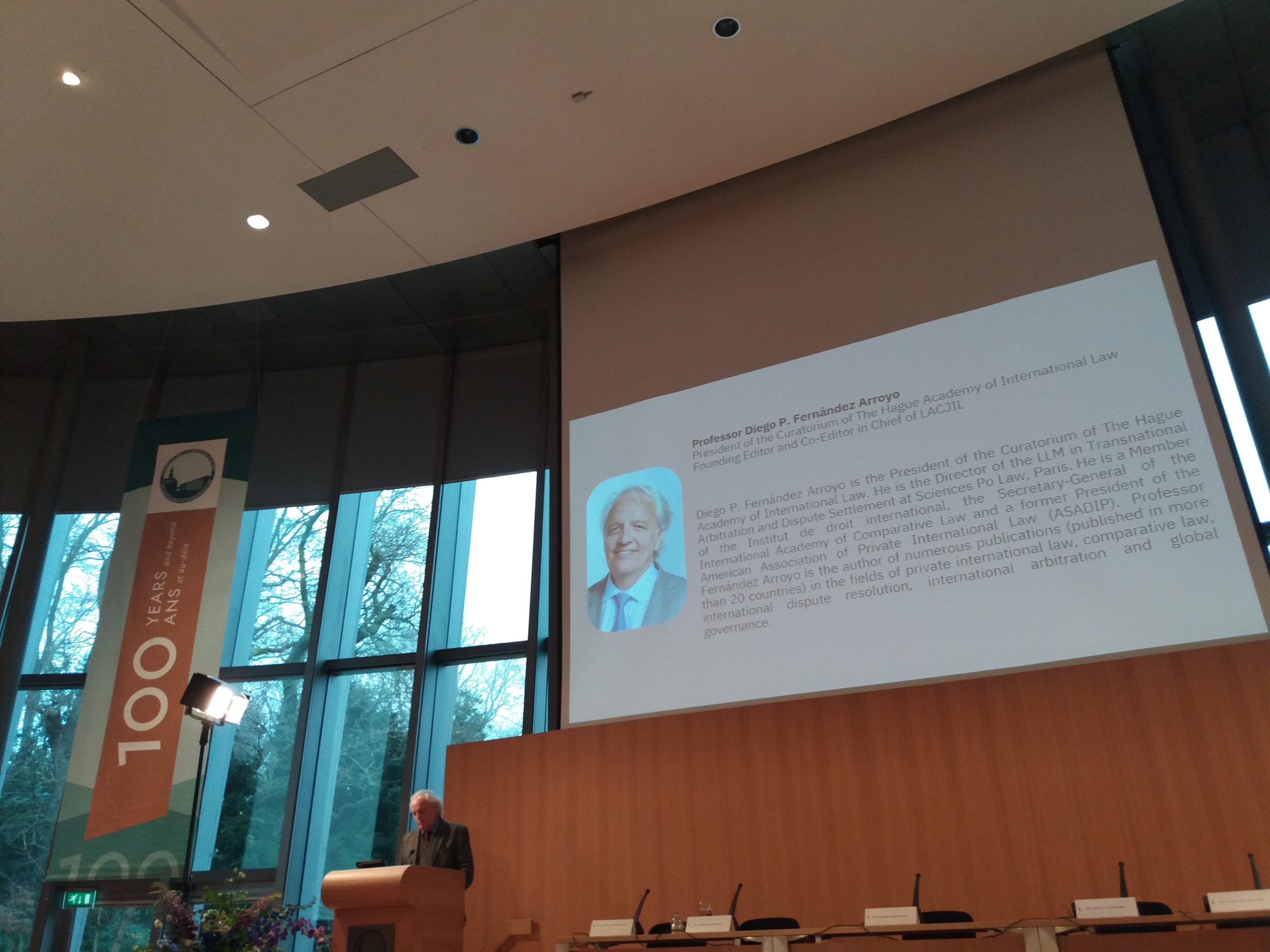
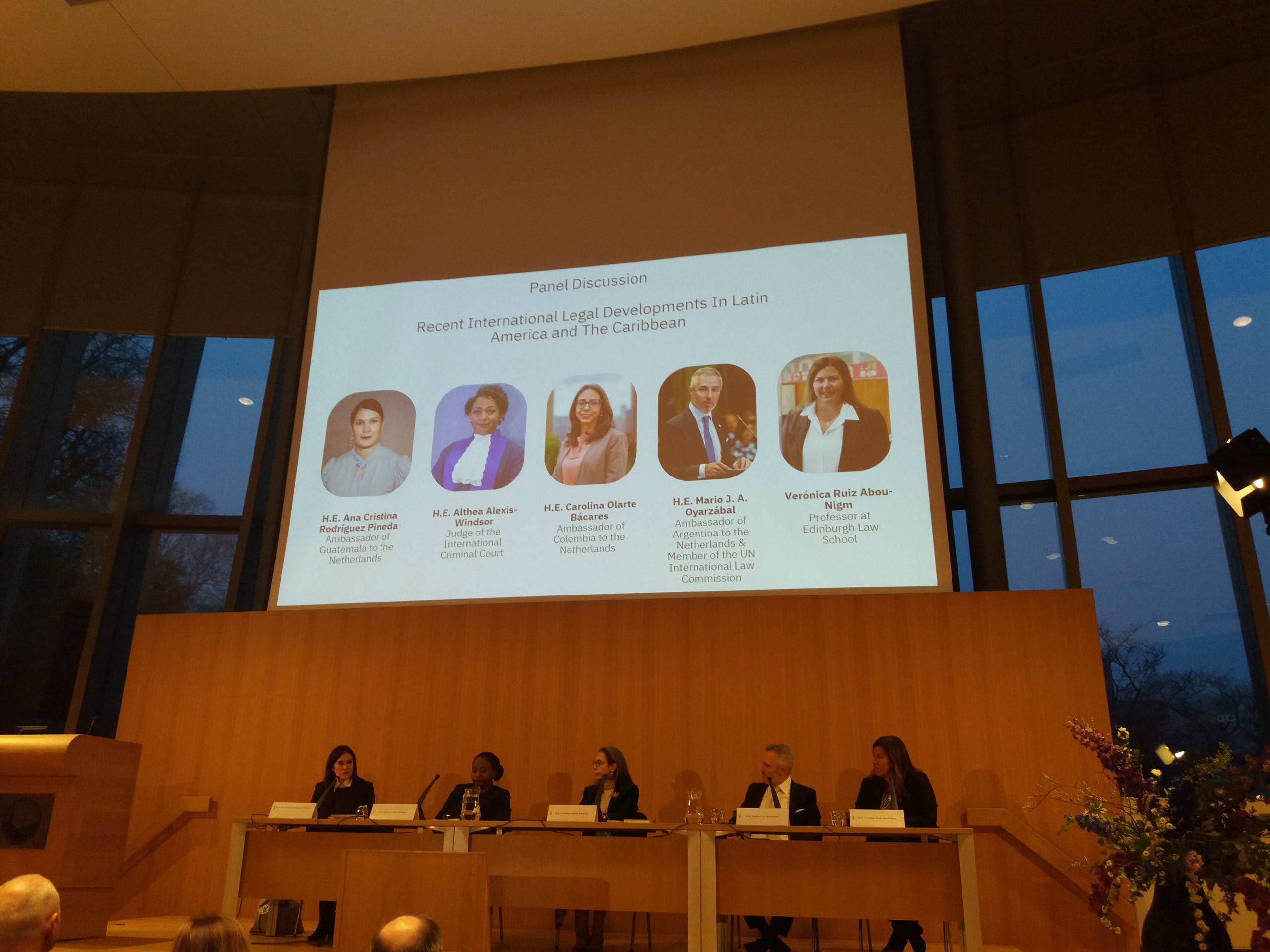
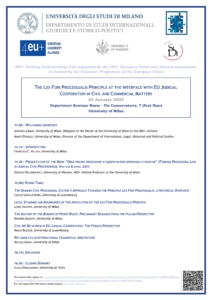
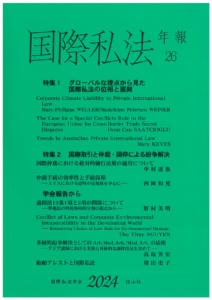
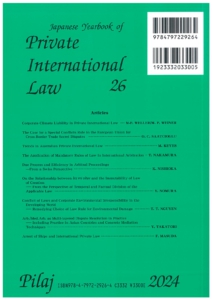

 Since its inception in 2001, the annual survey on Chinese judicial practice in private international law, published by the
Since its inception in 2001, the annual survey on Chinese judicial practice in private international law, published by the 




